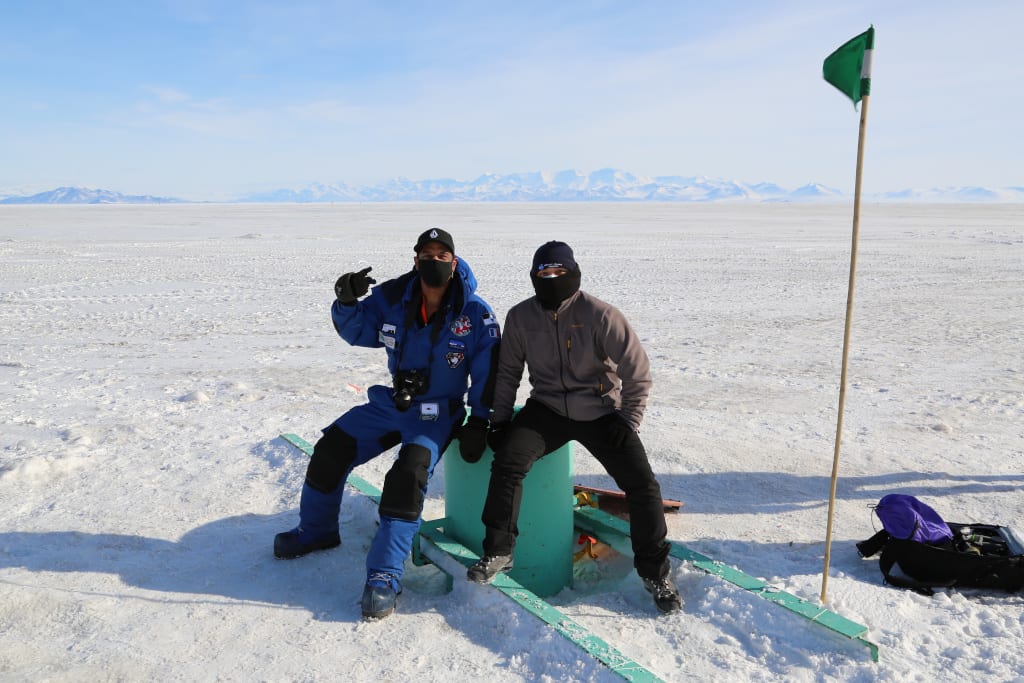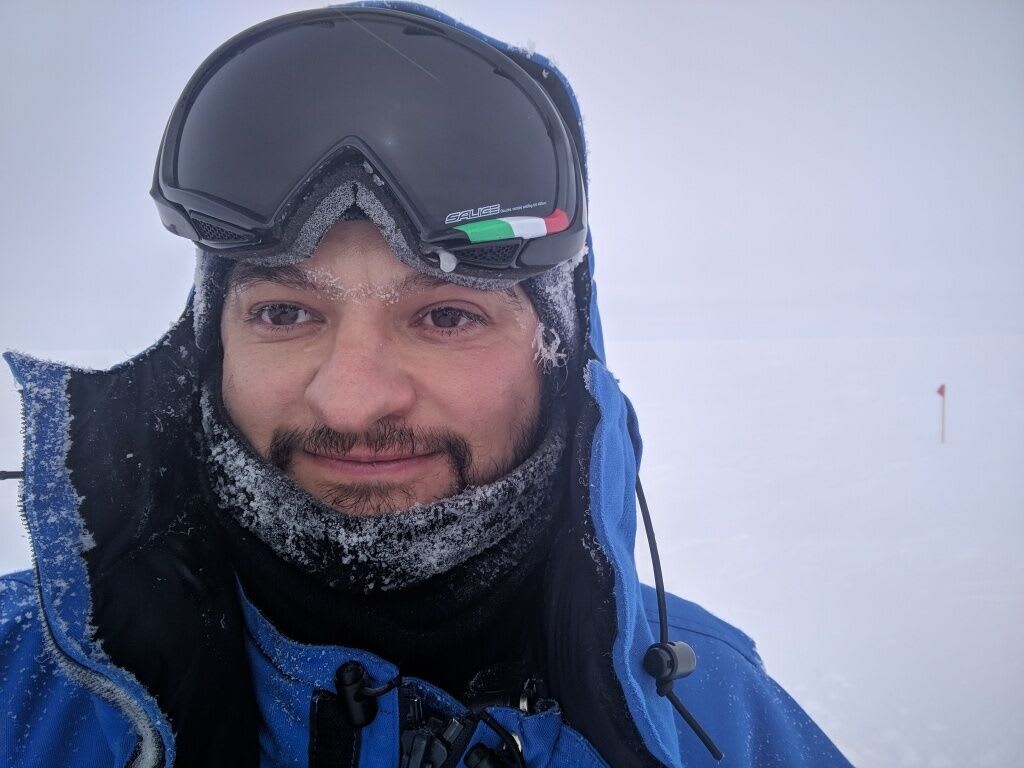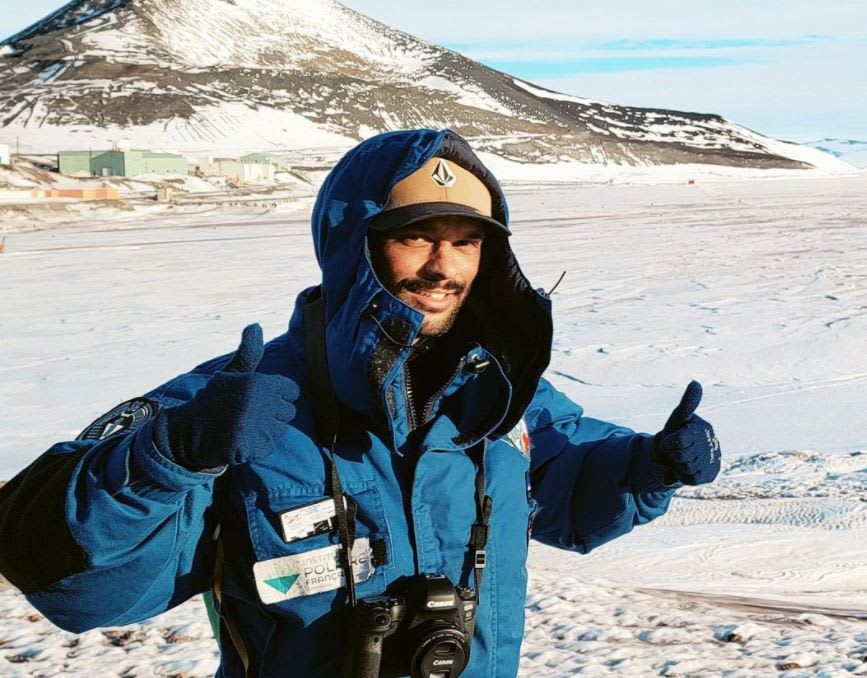
It’s that time of the year when last year’s winterovers are finally relieved of their duties as a new crew arrives at the South Pole. “Winterover” is the name given to the brave individuals who sign up to live and work at an Antarctic field station for a full year—sometimes longer—half of which is spent (at the South Pole, at least) in total isolation and utter darkness. But those who agree to do it are rewarded with incredible views of auroras, perfectly clear night skies, long-lasting friendships, and a lifetime of memories.
IceCube’s two new winterovers for the 2021-2022 season, Moreno Baricevic and Wenceslas Marie-Sainte, reached the South Pole last week! After a few weeks of training, they will be able to send Josh and Martin back “up north” for well-deserved rest and relaxation.
Read the Q&A below to learn about the new IceCube faces at the bottom of the world! One fun fact about these two: both have wintered over at other Antarctic stations in years past, including Concordia Station (though not at the same time). We are thrilled to have their expertise on the IceCube team as they get ready to take care of our South Pole detector for the next year.

Moreno Baricevic
Hometown:
Trieste, Italy
Job and institution before this one:
Senior System Administrator and HPC Specialist at CNR-IOM in Trieste, Italy
Tell us more about your previous experience as a winterover:
In 2018, I covered the position of “ElectroScience” for the 14th winterover (DC14) at Concordia Station, a French-Italian permanent research facility on the Antarctic Plateau, Dome C, Antarctica. Among my duties, I was responsible for maintenance and operation of various experiments and permanent observatories in geophysics (geomagnetism, seismology, space weather, and physics of the atmosphere). I spent 13 months, 9 of which were in isolation with a multinational crew of 13 members and with no possibility of leaving, in an extreme environment at high altitude, with rough living and working conditions (temperatures down to -80°C/-112°F, pressure altitude ~4,000 m/~13,000 ft).
I so deeply enjoyed that adventure, and I found it so fulfilling, that I truly wished to widen and deepen my experience in Antarctica in different scenarios, especially involving ambitious research projects like IceCube, where I have the opportunity to give my tiny contribution to the advancement of scientific knowledge.
Why did you apply for this opportunity?
During my winterover at Concordia Station, we investigated the activities and research projects conducted at other research stations in Antarctica and often wondered what life could be like at stations with larger crews, or larger facilities, or less harsh conditions on the coast or on the sub-Antarctic islands. At the time, I read about the IceCube Neutrino Observatory at the South Pole and thought that it was one of the most amazing research projects I had ever heard of.
A couple of years later, I decided I was ready to relive a similar experience and searched the internet for some clues as to whether it was possible to apply for other Antarctic national programs as a foreigner. By chance, I discovered that IceCube had two open positions for winterover operator at the South Pole. Being an international collaboration, IceCube did not impose strict requirements on the nationality of the participants. The background, experience, and skills requirements were 1:1 compatible with mine, so I applied right away without thinking twice.
What do you expect life to be like at the Pole?
I expect it to be similar to life at Concordia Station, but with a few major differences.
It may sound strange, but with a crew of around 40, I am afraid that it will be “crowded” compared to my previous experience where we were only 13, but the South Pole station is much bigger, too.
Another big difference from my previous winterover experience is that this time I will be one of a few foreigners, immersed in a different cultural environment, and I will have to constantly speak a foreign language. It will probably be challenging, but it will certainly be an opportunity for personal growth that will further enrich my experience.
What are you most looking forward to doing at the South Pole?
I can’t wait to finally see an aurora. 2018 was a year of solar minimum and Concordia Station is close to the center of the auroral oval (geomagnetic pole), so we never got a chance to see any auroras. It was really sad to watch colorful photos and videos full of amazing auroras shared by the other stations, and still be on the same continent without being able to see even a faint one.
The night sky, however, was incredibly stunning, and I can’t wait to stare at it, in awe, again.
Least looking forward to?
Having only two 2-minute showers a week, and the day that we will run out of fresh food.
What do you think you will miss the most about life up north?
What I missed the most during my previous time as a winterover was the rain and thunderstorms. I will definitely also miss longer showers, fresh fruits and vegetables, living things, woods, and mountains.
What is one goal you have for your time at the South Pole?
Getting along with all my crew mates and keeping myself busy when not occupied with the detector.
Surviving Celas will also be a huge success. 😉

Wenceslas (Celas) Marie-Sainte
Instagram: @ceelaas
Hometown:
I am from a small town called Saint-Malo, in the western part of France.
Job and institution before this one:
I was an electronic engineer on the French-Italian Antarctic Station named Concordia. I was working for the Institut Paul Emile Victor.
Tell us more about your previous experience as a winterover:
I wintered over twice, once at Crozet Islands (2013) and once at Concordia Station (2020).
At the Crozet Islands, I was in charge of nine research programs on site in geophysics (seismology, geomagnetism, climate change, and physics of the atmosphere) and one research program that aimed to monitor king penguin colonies.
At Concordia Station, it was significantly similar but with no penguins! I was instead doing astronomy; we were looking for exoplanets in our galaxy. That was also pretty exciting!
Why did you apply for this opportunity?
As I am very curious about science in the polar regions, I wanted to dig into another scientific subject. The IceCube neutrino experiment is a spectacular achievement of civil engineering and astrophysics. This alone was a good reason to apply.
The second one was to get the opportunity to live in another Antarctic station, to see the traditions and the customs of another nation through serving as a winterover.
What do you expect life to be like at the Pole?
Full of surprises—I love being surprised, and so far the people I have met have already surprised me by their strong kindness and their excitement for this upcoming polar season.
What are you most looking forward to doing at the South Pole?
I’d like to share this adventure as much as possible with people interested in our activities and life on this cold continent. I think science should be shared and spread!
Least looking forward to?
I don’t have any big fears, I am quite positive. I think even social issues that we might encounter here can be solved if we try to understand each other.
What do you think you will miss the most about life up north?
Apart from family and friends, I would say the rain and my bike. I love riding my bike in the rain in my region of France. It’s a green land, very rainy and windy.
What is one goal you have for your time at the South Pole?
Living at Pole is a wonderful opportunity to live in a small community away from the rest of the world. We learn a lot from the others, whether they work in medical, in supply, in science, or in IT. I can’t wait to see people sharing their life experience with the community.
And I am not worried about Moreno, he will survive working and living with me ahahah 😉